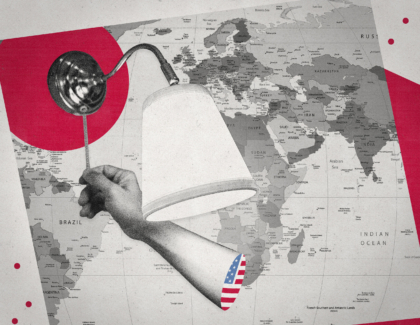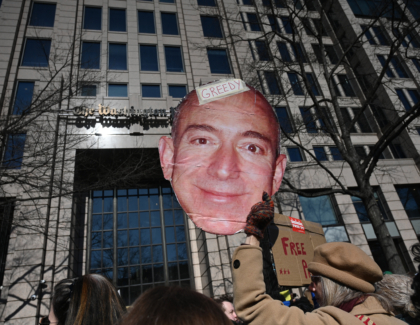Sign up for the daily CJR newsletter.
Language Corner aims to inform and entertain, and often discusses words and phrases in the news. We hope to keep this column informative and entertaining without adding to anyone’s burdens.
THESE ARE UNSETTLED TIMES—times when the word “unprecedented” shows up a lot, even though, as the Associated Press Stylebook says, “It means having no precedent, unheard of. Often misused.”
Another term showing up a lot is “unchartered waters.”
“Virus throws Mesa schools into unchartered waters,” a headline said, emphasis ours. The impact on the California job market means “we are really in unchartered waters,” another article said. Even our personal lives are affected: “But when it comes to coronavirus dating, we’re in unchartered waters, baby,” a column on the new normal said.
“Unchartered waters,” as those citations use it, means navigating without a map, going into the unknown. If the waters we are in now are “unchartered,” that means we were previously navigating “chartered” waters, where we knew where we were going because we had a guide of some sort. When you “charter” a boat, after all, it usually comes with at least a captain who does know where to go. And a membership chapter often comes with a “charter” from the main office, guidelines on how to operate locally. Without that “charter,” the local chapter is flying blind, “unchartered.”
Yes, you in the back, waving your hand vigorously? That’s wrong, you say? We mean “uncharted,” not “unchartered”?
You get an A. “Uncharted” means “not recorded or plotted on a map, chart, or plan,” Merriam-Webster says.
RECENTLY: ‘Rolodex,’ on rotation
Yes, student in the middle? Yes, “unchartered” is also in M-W. Did you read the entry? Would you like us to do so? M-W says it means “not granted or issued a charter : not chartered.” How often have we mentioned that just because the word is in the dictionary doesn’t mean it’s being used correctly?
The local chapter may be “unchartered”; the boat without a client may be “unchartered.” But the kinds of waters people are navigating now are not known—unprecedented, even. They are “uncharted.”
The difference between “uncharted” and “unchartered” is only two letters, and they both have the same number of syllables. So it’s not a surprise they are often mixed up.
While they stem from the same root, “charter” is the older. It entered Old English as “carta,” derived from the Latin word for “paper.” Remember the “Magna Carta,” the rights granted by King John of England in 1215? That translates as “Great Charter,” and marked among the first uses of the word “charter” in English to mean a “legal document or ‘deed,’ ” the Oxford English Dictionary says. (It picked up an h and changed its ending along the way.) A “charter,” in the late thirteenth century, was also a written contract between two people. But it was not until the early nineteenth century that the verb “charter” was used to mean “To hire (a ship or aircraft) by charter-party. Hence colloquial to hire (a vehicle, etc.),” the OED says. (Obviously, the aircraft came later.)
The noun “chart” came into English in the sixteenth century to mean a map, but the verb “to map” did not surface until the mid–nineteenth century, the OED says.
The adjective “unchartered” showed up in the early nineteenth century, and the adjective “uncharted” not many years later.
And they have been confused ever since.
The Grammarphobia blog has found the misuse of “unchartered” to mean “uncharted” dating to the mid–nineteenth century. “Here’s one from Shawmut: Or, the Settlement of Boston by the Puritan Pilgrims (1845), by Charles Kittredge True: ‘His prudence, patience, courage and energy made him the successful pilot of the ship of state in the unchartered waters into which she was launched.’ ”
Bryan A. Garner’s Modern English Usage says that the misuse has “been gradually spreading since the mid-1970s.” Even so, “unchartered” is still at Stage 1 of the five-stage Language-Change Index, which would give our student an F for insisting on “unchartered” to mean “unmapped.”
Some of the confusion could come from the difference between spoken and written language. Here’s a clip of a former vice chairman of S&P Global talking about criticism of the Federal Reserve Board last year. Did he say “unchartered,” or “uncharted”? It’s hard to say, but the headline was “Fmr. S&P Vice Chair: ‘We’re in unchartered waters.’ ”
“Unchartered” and “uncharted” are pronounced virtually identically by many people with a British (or Boston) accent, where the r sound is flattened to “eh” or “ah.” And, to be fair, most news-media uses of “unchartered” when “uncharted” is meant are in direct quotations, which, as many journalists are taught, should not be changed. But if, oh, a United States president pronounced his vice president’s name as another word, let’s say “pounce,” would most journalists change it when they wrote it? Presuming the purpose were not ridicule, that is?
The best guideline for journalists might be this: If “unchartered” is in a quotation from someone who does not flatten their r’s, follow your publication’s guidelines on correcting pronunciation in a quotation. But outside of quotations, chart the right course and make those waters “uncharted.” That way, your audience won’t be lost at sea.
ICYMI: Absolute power by any other name
Has America ever needed a media defender more than now? Help us by joining CJR today.







